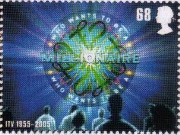Who Wants to be a Millionaire?
m |
m |
||
| Line 268: | Line 268: | ||
[[Category:General Knowledge Quiz]] | [[Category:General Knowledge Quiz]] | ||
[[Category:Celador Productions]] | [[Category:Celador Productions]] | ||
| + | [[Category:Gambling]] | ||
Revision as of 14:52, 10 June 2006
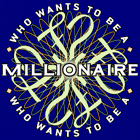
Synopsis
Well, it had to happen at some stage, but perhaps even we didn't expect this go-for-the-throat show to be such a huge success. The previous unconvincing "let's raise the stakes" show, Raise the Roof, was still fairly fresh in the memory, and this new show might have been just the same but with an extra "0" on the end of the budget. Thankfully, not so.
The timing
However, there were a few things that were intriguing before the programme was even broadcast which made things look distinctly promising. The major clue that something special was on its way was that ITV was clearing some cupboard space for this baby. The idea was that the programme would appear at roughly the same time every night for 12 consecutive days, bulldozing through whatever scheduled episode of Inspector Wexford or The Bill was supposed to appear there instead. Good grief, even the ITV golden goose of Coronation Street was once rescheduled because of it!
The rules
Ten contestants from around the UK take part in each programme. From the ten qualifiers, one contestant is chosen via a timed question. This contestant plays for the £1 million top prize.
The contestant must answer 15 multiple-choice questions correctly in a row to win the jackpot. The contestant may quit at any time and keep their earnings. For each question, they are shown the question and four possible answers in advance before deciding whether to play on or not. If they do decide to offer an answer, it must be correct to stay in the game.
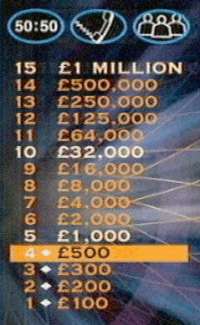 The money tree. Currently, this contestant is at £500. Answering the next question correctly earns them a guaranteed £1,000 - no matter what happens thereafter.
The money tree. Currently, this contestant is at £500. Answering the next question correctly earns them a guaranteed £1,000 - no matter what happens thereafter.If at any stage they answer incorrectly, they fall back to the last "guarantee point" - either £1,000 or £32,000 - and their game is over. For example, a contestant failing on question 13 would win £32,000. Answering incorrectly before reaching the first guarantee point (£1,000) loses everything. A new player is picked from the remaining pool of 10. If time runs out on a particular programme, the next programme continues that player's game.
When the money starts getting really serious (£32,000 and over), the host will reach for the appropriate cheque and sign it. Whilst this is mainly used as a theatrical device, the cheques can be cashed in by the contestants for real.
Lifelines
At any point, the contestant may use up one (or more) of their three "lifelines". These are:
- 50:50 option - two of the three incorrect answers are removed (invariably, the two you knew it couldn't be).
- Phone a friend - the contestants may speak to a friend or relative on the phone for 30 seconds to discuss the question.
- Ask the audience - the audience votes with their keypads on their choice of answer.
Each lifeline may only be used once during a contestant's entire game.
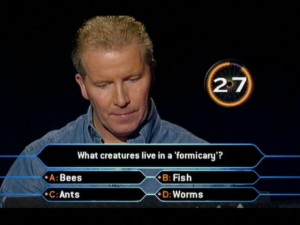 A phone-a-friend in progress
A phone-a-friend in progressThe host
Chris Tarrant (pictured) is one of those game show hosts whose job it is not just to get up your nose, but to tickle your nostrils and play with the nasal hairs while he's in there. He has perfected the art of getting people to scream "WILL YOU JUST DAMN WELL GET ON WITH IT!" at the radio through his years of running promotional games on Capital FM (his 9-to-5 job is a disc jockey - shouldn't that be 6-to-10 job?)
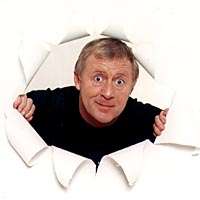 Millionaire maker, Chris Tarrant
Millionaire maker, Chris TarrantWhile Who Wants... was a very simple idea, it needed a good host to carry it off and Tarrant was that host. For example, if the producers had plumped for Richard Madeley, Les Dennis or even Brucie it's almost certain that the ITV audience wouldn't have been anywhere as captivated.
Tarrant's style was essentially his usual zany/wacky persona, but unusually in this game he showed that he could be professional and accurate when the need arose (e.g. when reading out the initial qualification question, where time of response was critical). Yes, he was annoying when he took about a minute before telling the contestant know that they had now won "...X THOUSAND POUNDS!!!", but that's the point - no-one else in the business could built up this suspense. He made you care.
Marks for style and technical merit
Putting the easy-to-pick-up format and the host aside for one moment, it's clear that some T.L.C. went into the making of the show. In fact, the whole theme of the programme seemed to take the essential classic elements of a quiz but present them using modern metaphors. For example, the synthesizer fanfare theme music was dramatic, but if you listened closely you could make out more than a passing semblance of the actual famous "Who Wants to be a Millionaire?" song - so famous, we can't remember what film it appears in. There was even some extremely nice Pet Shop Boys-esque background music while the contestants pondered about the questions, with deep, gothic-sounding choirs intermixed with high-pitched electronic arpeggios. The entire musical score is even available on CD (see Merchandise below).
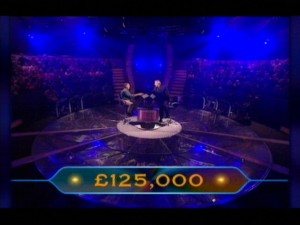 The famous Millionaire set, based in Elstree, London
The famous Millionaire set, based in Elstree, LondonThe set is one of those "in the round" numbers. Perhaps not the most original idea in recent times, but it's so nicely constructed (with its suspended Perspex floor with a huge dish-shape underneath covered in mirror paper) you could tell Terrence Conran would approve.
The lighting also deserves a passing mention, with the spotlights zooming down on the contestant after each major question answered. Even the logo is smartly and wittily executed, mixing the traditional intricate bank note patterns with question marks and pound signs.
What happened?
Scenes like nothing else in recent quiz show history took hold when WWTBAM? was broadcast. Towards the end of the first series, it was bringing in 18+ million viewers. It even beat some editions of the perennial ITV ratings stalwart, Coronation Street. The show deserved these ratings though - it wasn't just any old quiz.
THAT mistake
On the episode aired on March 8th 1999 Tony Kennedy, a warehouseman from Blackpool, was asked the following question for £64,000:
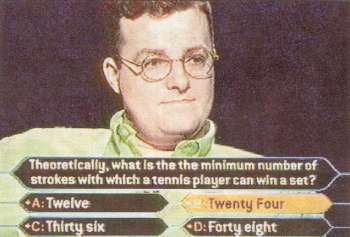 After some deliberation, Tony decides he will play. He offers the answer B, which is locked away into the computer.
After some deliberation, Tony decides he will play. He offers the answer B, which is locked away into the computer.The computer told Chris Tarrant that the correct answer was indeed B, and Tony also went on to win £125,000 by answering the next question correctly.
However, minutes later viewers began ringing ITV and the newspapers to complain. It turns out that the answer to the question is A (twelve). This is because you could serve twelve aces to win games 1, 3 and 5, then your opponent could double-fault twelve times, so you win games 2, 4 and 6 without hitting a shot and hence win the set after twelve shots.
This blunder made front-page news, and the next day an apology was broadcast. Tony was allowed to keep his money.
 "FAULT!" ran the front page headline of the Daily Mirror the next day. Incidentally, the Mirror is the arch-rival of the Sun, the newspaper sponsoring the programme at the time.
"FAULT!" ran the front page headline of the Daily Mirror the next day. Incidentally, the Mirror is the arch-rival of the Sun, the newspaper sponsoring the programme at the time.The first millionaire
After 122 programmes, Judith Keppel became the first person to answer all 15 questions correctly in the original UK version of the show. Allegations of a fix (unsubstantiated, to our eyes) raged in the newspapers because the episode happened to coincide with the final ever episode of the popular situation comedy One Foot in the Grave on rival channel BBC 1.
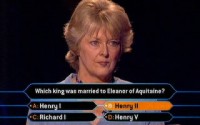
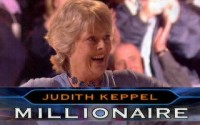 Judith Keppel becomes £1 million richer
Judith Keppel becomes £1 million richerThe question Judith answered to win the money was:
Which king was married to Eleanor of Aquitaine?
A: Henry I
B: Henry II
C: Richard I
D: Henry V
Judith correctly answered B. Because of the pound's exchange rate, her win was the highest ever win on the quiz show anywhere in the world.
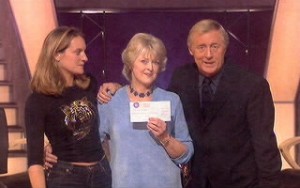
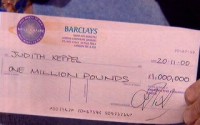 Judith holds her cheque with her daughter (top) and Tarrant (bottom)
Judith holds her cheque with her daughter (top) and Tarrant (bottom)Despite the big win, there's no doubt Chris Evans spoiled the party a little by beating Tarrant to giving away £1 million on air. His Channel 4 TFI Friday entertainment show gave away £1 million in a spoiler slot during December 1999 called Someone's GOING to be a Millionaire (subtle, no?), which wasn't a patch on the real Millionaire except in one regard - namely, there was a guaranteed payout.
Millionaire has opened many doors for British TV producers. With this show now signed up to over 100 countries, there's no doubt that the world will be watching the television emanating from this fair land more closely in future.
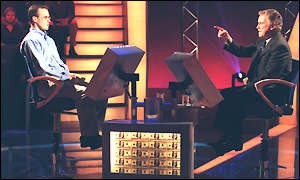 Regis Philbin (right), host of the US version, tells John Carpenter that he is the first millionaire of the US series.
Regis Philbin (right), host of the US version, tells John Carpenter that he is the first millionaire of the US series.Key moments
One of the show's most memorable episodes came in January 1999 when two contestants won £125,000 on the same show. Martin Skillings, a quantity surveyor from Brancaster, became the first person ever to break the £100,000 barrier, only for Ian Horswell - the very next contestant - to repeat the feat around 40 minutes later.
Not one of the show's highest winners in terms of money, but certainly one of the most effervescent was Fiona Wheeler, famous for her wish to bathe in a bath of chocolate (something she later did do in a subsequent photo shoot). The question that won her £32,000 (What part of the body is called the trachea?) was a gift - she happened to be a fan of the medical drama series Casualty.
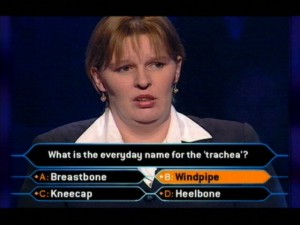 Fiona Wheeler
Fiona WheelerIn a Valentine's Day celebrity speicial shown on 11 February 2006 (which is not Valentine's Day), Laurence and Jackie Llewelyn-Bowen (playing for the Shooting Star Children's Hospice) reached the million-pound question. They were asked: "Translated from the Latin, what is the motto of the United States?" The Bowens went for 'In God We Trust', and in so doing lost their charity a stonking £468,000, the correct answer being 'One Out of Many', from the Latin 'E pluribus unum'. However! It was later decided that the question was ambiguous, since 'In God We Trust', while not from any Latin source, is used as a motto for the US. So Laurence and Jackie were given another million-pound question ("Who was the first person to go into space twice?") which they did not attempt to answer, leaving with £500,000.
And then of course, there was the Major Charles Ingram affair, which is covered in depth elsewhere on this site.
Catchphrases
"Is that your final answer?"
"...but we don't want to give you that!"
"Or you could ask the audience... who are nearly always right"
Inventor
The format was devised by David Briggs, who also devised many of the promotional games for Chris Tarrant's breakfast show on London radio station Capital FM, along with comedy writers Mike Whitehill and Steve Knight. The Fastest Finger First round bears a remarkable similarity to a round from a much earlier Celador/Tarrant show, Everybody's Equal.
Theme music
The much-lauded music, which runs almost continuously throughout the whole show, was written by Keith and Matthew Strachan. There are over 140 different musicals stings stored in the central computer that controls the questions (see Merchandise below). The music for the pilot was composed by Pete Waterman.
Trivia
When Chris Tarrant hosted the Capital breakfast radio show, he was commuting between central London, the WWTBAM studio in Wembley (or Elstree) and his home in Surrey. As such, he'd only get a few hours sleep a day. He had a second bedroom in the studio so he can get some kip before rehearsals.
Originally, the intended idea was for the contestants to start at £1 and answer 21 questions. However, the first part of the game proved to be too boring so they started at £100 in the final format.
The questions come out in stacks chosen from a database of 2,500 possible questions. The computer, programmed by game show stalwart Chris Goss, also provides many of the music and lighting cues.
WWTBAM is the only UK game show to have been honoured with a postage stamp. It is one of six ITV programmes featured in a set issued in September 2005 to mark ITV's 50th birthday.
Via the US version, Millionaire producer Paul Smith (no relation to the fashion designer) brought such good ratings to the otherwise flagging ABC channel that it was said he was held in such high esteem in the Disney-owned network that he was second only to Mickey Mouse.
If you go to Disney-MGM Studios in Florida, you can play Millionaire live for a chance to win a cruise - and anyone can win! The youngest person ever in the chair was two years old.
Merchandise
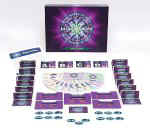 WWTBAM - Edition II Board game
WWTBAM - Edition II Board game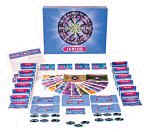 WWTBAM Junior Board game
WWTBAM Junior Board game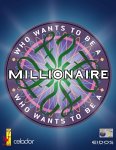 WWTBAM computer game
WWTBAM computer game WWTBAM computer game - 2nd edition
WWTBAM computer game - 2nd edition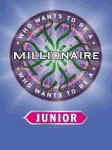 WWTBAM computer game - Junior edition
WWTBAM computer game - Junior edition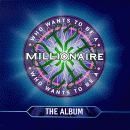 The UK Soundtrack album The complete music score for the show on CD
The UK Soundtrack album The complete music score for the show on CD WWTBAM Quiz books
WWTBAM Quiz books Behind the Scenes at "Who Wants to be a Millionaire?" Book by Tom McGregor
Behind the Scenes at "Who Wants to be a Millionaire?" Book by Tom McGregorWeb links
Series 3 - results listing (incomplete)
Results from recent series available on the official site
Pictures
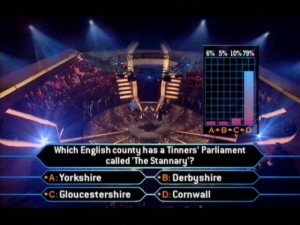 Picture 1 - After an Ask the Audience lifeline, the crowd seem pretty sure the answer is D.
Picture 1 - After an Ask the Audience lifeline, the crowd seem pretty sure the answer is D.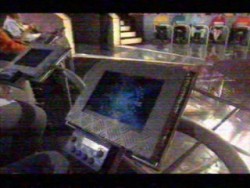 Picture 2 - The screens and keypads used for the Fastest Finger First round.
Picture 2 - The screens and keypads used for the Fastest Finger First round.
